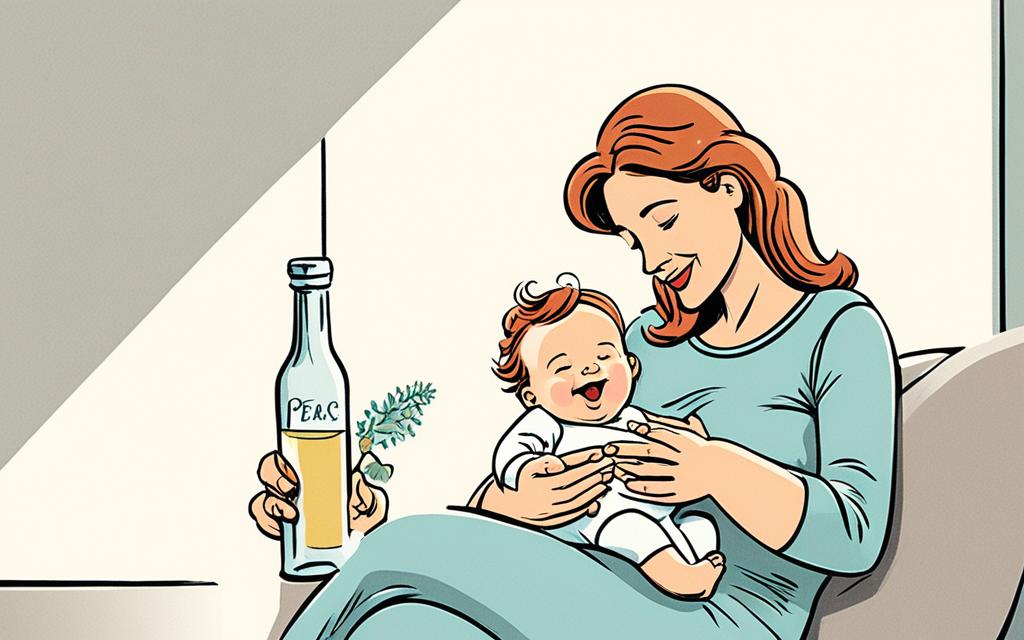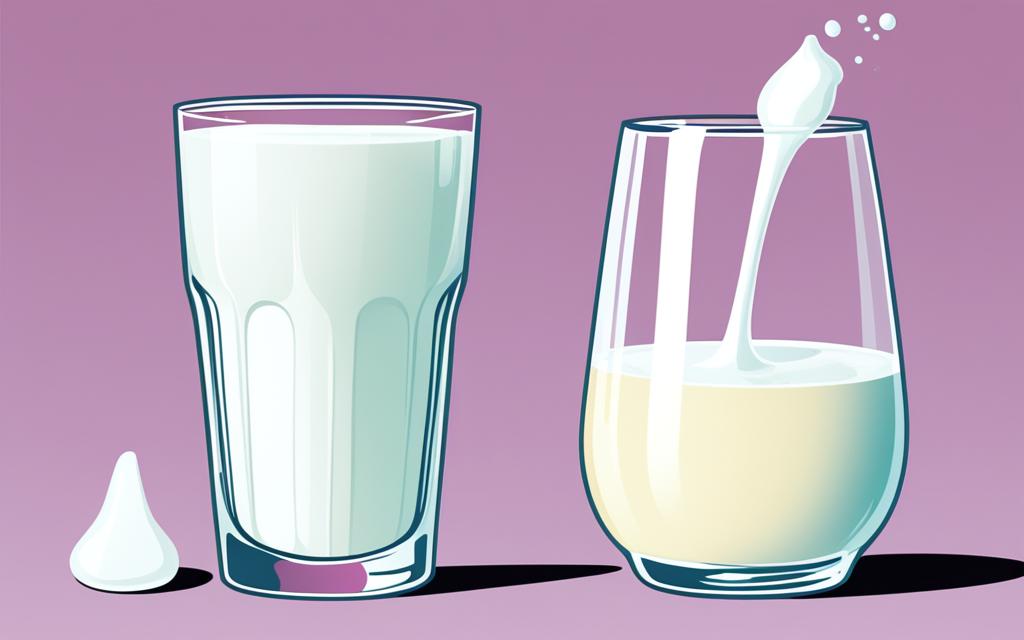One of the common concerns for breastfeeding mothers is the consumption of alcohol while nursing. It’s natural to wonder how much alcohol is safe to drink without affecting the well-being of your baby. Understanding the relationship between alcohol and breast milk is crucial to make informed choices for both yourself and your baby’s health.
Many studies have shown that a negligible amount of alcohol can pass into breast milk, impacting the little one’s development and overall health. While it’s essential to enjoy some relaxation time and occasional social drinks, it’s equally important to know the boundaries and adhere to responsible alcohol intake practices.
Key Takeaways:
- Alcohol consumption while breastfeeding should be done in moderation to minimize any potential risks.
- Generally, it is recommended to limit alcohol intake and plan accordingly to avoid breastfeeding immediately after drinking.
- Alcohol reaches its peak concentration in breast milk about 30-60 minutes after consumption, so timing is crucial.
- It is advised to wait at least 2 hours per standard drink before breastfeeding to ensure alcohol levels have decreased.
- Be cautious of the amount of alcohol consumed, as excessive intake can have negative impacts on your baby’s development and sleep patterns.
Remember, being a responsible and informed breastfeeding mother means making choices that prioritize your baby’s well-being. Consult with a healthcare professional for personalized advice based on your specific circumstances.
Guidelines for Drinking Alcohol and Breastfeeding
When it comes to breastfeeding, many mothers have questions about alcohol consumption and its potential impact on their babies. While it’s generally recommended to avoid alcohol while breastfeeding, moderate and responsible drinking can be safe in certain situations. Here are some guidelines to help you navigate drinking alcohol while breastfeeding:
1. Know your limits
It’s crucial to understand the recommended limits for alcohol intake while breastfeeding. The American Academy of Pediatrics suggests that nursing mothers limit their alcohol consumption and avoid excessive drinking. One way to gauge your limits is by following the “pump and dump” method, which involves expressing milk after consuming alcohol and discarding it. This helps ensure that your baby isn’t exposed to high levels of alcohol through breast milk.
2. Allow time for alcohol to clear your system
Alcohol takes time to metabolize and clear from your system. On average, it takes about two to three hours for an alcoholic beverage to be processed and eliminated from breast milk. To minimize your baby’s exposure, wait at least two hours per standard drink before breastfeeding again. Remember that the timing may vary depending on factors such as body weight, metabolism, and the amount of alcohol consumed.
3. Plan ahead and be prepared
If you plan on having a drink, consider pumping and storing milk in advance. This allows you to have a supply of breast milk to feed your baby while you wait for the alcohol to clear your system. It’s also essential to have a backup plan in case you become too intoxicated to breastfeed safely. Having a trusted caregiver or stored breast milk ensures that your baby’s needs are met while you prioritize responsible alcohol consumption.
4. Monitor your baby’s reaction
Pay attention to your baby’s behavior and reactions after you’ve consumed alcohol. Some infants may exhibit fussiness, poor sleep, or changes in feeding patterns if they have been exposed to alcohol through breast milk. If you notice any unusual or concerning symptoms, consult with a healthcare professional for guidance.
5. Consider alcohol alternatives
If you’re concerned about the potential risks associated with drinking alcohol while breastfeeding, there are alternatives you can explore. Non-alcoholic beers and wines, mocktails, and other alcohol-free beverages can provide a satisfying drink experience without the presence of alcohol.
Remember, these guidelines are intended to provide general recommendations. Every individual and breastfeeding journey is unique, so it’s crucial to consult with healthcare professionals for personalized advice. By following these guidelines and making informed choices, you can navigate drinking alcohol responsibly while maintaining the health and well-being of your baby.

Conclusion
In conclusion, it is important for breastfeeding mothers to exercise responsible alcohol consumption. While small amounts of alcohol may not be harmful to your baby, excessive alcohol intake can have adverse effects on both you and your nursing infant.
To ensure the well-being of your baby, it is recommended to wait at least 2-3 hours after consuming alcohol before breastfeeding. This allows your body ample time to metabolize the alcohol and reduce its concentration in breast milk.
Additionally, using alcohol test strips can help you determine if there is any alcohol present in your breast milk before nursing. These test strips provide a simple and convenient way to safeguard your baby against alcohol exposure.
Remember, the best approach is to always prioritize the health and safety of your baby. If you have any concerns or questions regarding alcohol consumption while breastfeeding, consult with a healthcare professional who can provide personalized guidance and support.


